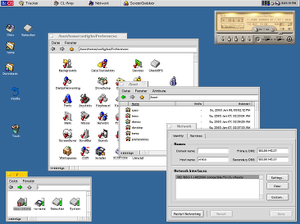BeOS is an operating system for personal computers first developed by Be Inc. in 1991. It was first written to run on BeBox hardware. BeOS was built for digital media work and was written to take advantage of modern hardware facilities such as symmetric multiprocessing by utilizing modular I/O bandwidth, pervasive multithreading, preemptive multitasking and a 64-bit journaling file system known as BFS. The BeOS GUI was developed on the principles of clarity and a clean, uncluttered design.
The API was written in C++ for ease of programming. It has partial POSIX compatibility and access to a command-line interface through Bash, although internally it is not a Unix-derived operating system.
BeOS used Unicode as the default encoding in the GUI, though support for input methods such as bidirectional text input was never realized.
BeOS was positioned as a multimedia platform that could be used by a substantial population of desktop users and a competitor to Classic Mac OS and Microsoft Windows. It was ultimately unable to achieve a significant market share, however, and proved commercially unviable for Be Inc. The company was acquired by Palm Inc. and today BeOS is mainly used and developed by a small population of enthusiasts.
The open-source OS Haiku, a complete reimplementation of BeOS, is designed to start up where BeOS left off. Beta 1 of Haiku was released in September 2018, six years after Alpha 4.[3]
Source: BeOS | Revolvy

